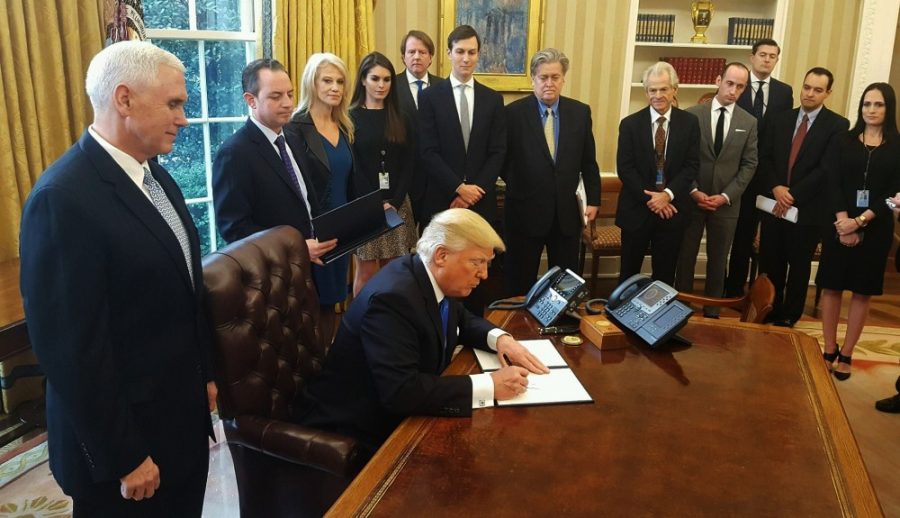President Donald Trump signed a revised executive order that eliminated Iraq from the list of banned countries and Syria from an indefinite ban.
The new executive order will be placed into effect on March 16. Previously the original executive order was enacted the day of the signing by Trump. Some citizens were immediately detained and questioned when trying to enter which sparked protest at major U.S. airports.
The six countries the order targets are: Syria, Libya, Sudan, Iran, Yemen and Somalia. Each country will still be under 90-day suspensions for its immigrants. Refugees from these countries will be restricted from the U.S. until a period of 120 days has passed.
The executive order states the ban will help agencies focus on reviewing vetting policy “to ensure the proper review and maximum utilization of available resources for the screening and vetting of foreign nationals,” and “to ensure that adequate standards are established to prevent infiltration by foreign terrorists.”
The previous executive order placed a ban on Syrian refugees for an indefinite amount of time. Now, Syria will be given the same amount of time before immigrants and refugees will be allowed to enter the U.S.
RELATED: Law professors give advice following Trump’s immigration orders
The only country to be taken off the list of temporarily banned countries was Iraq. Iraq was deemed a special case stated in the order and deserved different treatment. “Nevertheless, the close cooperative relationship between the United States and the democratically elected Iraqi government…the significant presence of United States forces in Iraq, and Iraq’s commitment to combat ISIS justify different treatment for Iraq,” the order states.
The new travel ban does not take a preference to religious minorities. Mainly those facing religious persecution would’ve been given special consideration to enter the U.S., Trump said in an interview with the Christian Broadcasting Network.
The amount of refugees permitted into the U.S. will stay the same. The Trump administration will set the cap amount at 50,000 people, a drop from the former Obama plan for 110,000 refugees. The order states that during this time refugees will be admitted into the U.S. on a case-by-case basis only if it’s determined to be in the national interest to do so.
Faten Ghosn, associate professor in the School of Government and Public Policy, said there is important information being left out of the whole process of the travel ban.
“The first important thing that we’ve lost sight of is what are the current vetting systems,” she said. “If you talk to individuals in the government and individuals who know what it takes to get a visa, we already have a strong vetting process.”

Ghosn said the executive order would make sense if there had been a study describing what specifically needed to be worked on during the length of the ban.
“Right now I think what’s creating all of this confusion is that we do not understand why we need this, given that we’ve not had any problems in our visa process,” she said.
She said that there may have been other problems but the vetting system hasn’t brought forth any evidence of wrongdoing.
“We do not talk about what we currently have before we start talking about ‘let’s fix it,” Ghosn said. “I’m not saying that we might not need new vetting procedures but it will be interesting to see where are the holes that need to be fixed.”
Suzanne Panferov, associate vice president of Global Initiatives at the UA said the time before the ban is in effect could help.
RELATED: Definitions of humanity: Pouye Khoshkoo describes life after Trump’s immigration ban
“What’s kind of helpful with this travel ban is that it’s not an immediate flurry of activity to get notifications out,” she said. “We are direct messaging to faculty, students and staff who have citizenship from the six affected countries much like we did before.”
Panferov said the office is taking the necessary actions to inform those on official business leaving or tying to enter into the U.S.
“There’s also the component of, generally, faculty or staff that go out on official business for the U of A who might travel outside of the United States,” Panferov said. “Depending on their own country of origin, the passports that they carry, they need to be aware of the travel ban and it affects around the globe.”
The Global Initiatives office is now ready to rapidly respond if additional measures are put in place.
“We already have systems in place for how to rapidly respond to communications like this,” Panferov said. “There may be future executive orders that affect our student, faculty or scholars and so we’re ready now to have responses and hope we never have to do it again.”
Follow Shaq Davis on Twitter.









